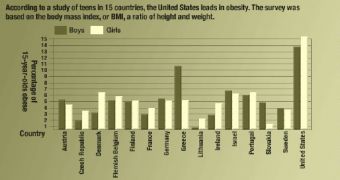According to a new investigation funded by the Economic and Social Research Council (ESRC), it may be that teenagers' diet and eating habits are heavily influenced by their social background.
The paper essentially shows that the diet, weight and health of teens is directly influenced by practices and perceptions of different social classes, and is the first research ever to reveal this association. Policymakers have for a long time insisted that such investigations be conducted, so that informed decisions on the matter could be taken, e! Science News reports.
“It is evident that children are molded according to their parents' expectations about behavior,” explains the leader of the new research, University of Hertfordshire expert Dr. Wendy Wills.
By looking at the diets, weight levels and health statuses of middle class teens and their parents, the expert says that a clear conclusion about the ideals and beliefs of the family can be successfully drawn. The parenting skills of mothers and fathers can be inferred as well, Wills says. The research is made even easier when middle-class families are compared with working class families.
The investigation showed that parent in middle-class families are very concerned about their children's health and fitness status. They report that they encourage their offspring to keep healthy, so that they can actively participate in adult life.
Generally, obesity is frowned upon, in the sense that parents believe the condition could affect their children's ability to manage themselves later on in life. This situation is very different from that in working class families. “In the context of risk and insecurity for working class families, the ideal body shape has little value,” Wills reveals.
Middle class teens view obesity and being overweight as a sign of weakness. That is to say, they generally believe that people who are so cannot refrain from eating unhealthy food, and cannot control their appetite. They also believe that individual laziness plays an important part. Their parents are also morally motivated to push their children into adopting a healthier life style, so as to keep their weight within “acceptable” limits.
“Given the complex, embedded nature of familiar practices and beliefs, policy and practice targets need to be realistic in terms of the timescale needed for achieving change,” the expert adds. The study warns policymakers that, regardless of the laws they implement, results will take some time before they become visible. NHS Health Scotland has for instance used the new finds to implement child healthy weight initiatives, through its Health Boards.

 14 DAY TRIAL //
14 DAY TRIAL //